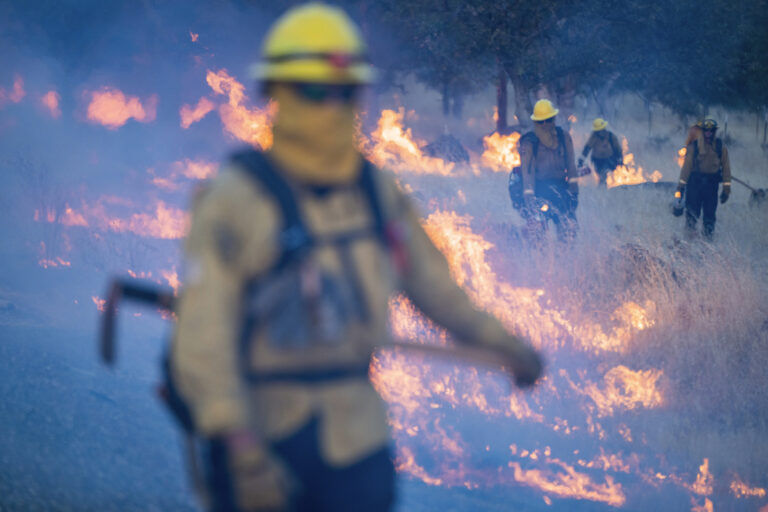
Fire crews light a burn operation along Highway 36 to slow the Park Fire near Dales, Calif., July 29, 2024. (AP/Nic Coury)
This year’s Republican Party platform, which pledges to lift restrictions on energy production and terminate "the Socialist Green New Deal," makes no mention of climate change.
Surprised? Of course not.
These days, climate skepticism no longer denies that human activity is responsible for making every year hotter than the year before. Rather, it sticks its fingers in its ears and says la-la-la-la-la!
Not only are the words "climate change" to be banned from government (as in Florida), but those agencies charged with monitoring it, such as the National Oceanic and Atmospheric Administration, are to be dismantled (so says Project 2025). What you don’t know can’t, it seems, hurt you.
All this stands in utter contrast, of course, to the Biden administration’s unprecedented effort to combat climate change via the Inflation Reduction Act and the Bipartisan Infrastructure Act, which place the full weight of the federal government behind a wide range of initiatives to reduce greenhouse gas emissions.
Rather than contest the overwhelming evidence of anthropogenic climate change, the new climate denialism asserts that such initiatives just won’t work. While this represents a telling shift — call it a strategic retreat — in denialist messaging, it’s also a doubling down on the anti-government ideology that has been a staple of faith-based climate skepticism.
Back in the 1990s, political opposition to fighting climate change came about through an unholy alliance (funded by the fossil fuel industry) of economic libertarianism and conservative Christianity. At its helm was an organization initially called the Interfaith Council for Environmental Stewardship and ultimately the Cornwall Alliance for the Stewardship of Creation.
Its ideology was encapsulated in the 2000 Cornwall Declaration on Environmental Stewardship, which declared, "We aspire to a world in which liberty as a condition of moral action is preferred over government-initiated management of the environment as a means to common goals." Claims of global warming were "speculative" and "exaggerated."
Advertisement
If the libertarians opposed government intrusion as a matter of principle, the Christians — particularly the evangelical ones — had grown accustomed to considering the government to be a secular humanist enterprise hostile to their religion. In this century, that view has grown apace.
In a talk at the College of the Atlantic in Bar Harbor this week, journalist Tim Alberta — the evangelical preacher’s kid whose recent book, "The Kingdom, the Power, and the Glory," explores the current state of evangelical politics — argued that the COVID-19 pandemic locked evangelicals into support for Donald Trump. That’s because, in their view, official injunctions — federal, state or local — to suspend in-person worship seemed to be proof positive that the government was bent on destroying their religion.
For them, the lesson with respect to climate change, as well as to the pandemic, was: "Sure, the threats to health and life on earth may be real, and the proposed remedies, de-carbonization and vaccines, may actually work. But the government is using them in its campaign against Christianity, and that is more than enough reason to oppose them."
In a recent article, Robin Veldman, a religious studies professor at Texas A&M who studies religion and climate, makes a case that faith-based opposition to climate action is part of a conservative Christian civil religion that serves to unite conservative Christians against a state perceived as intent on persecuting them.
Whether or not "civil religion" is the right term here — a discussion for another day — there’s little question that climate action has joined with abortion and LGBTQ rights as the triune abomination of faith-based conservatism today. And little question that the Biden administration’s advances on the climate front have only stiffened the opposition.




